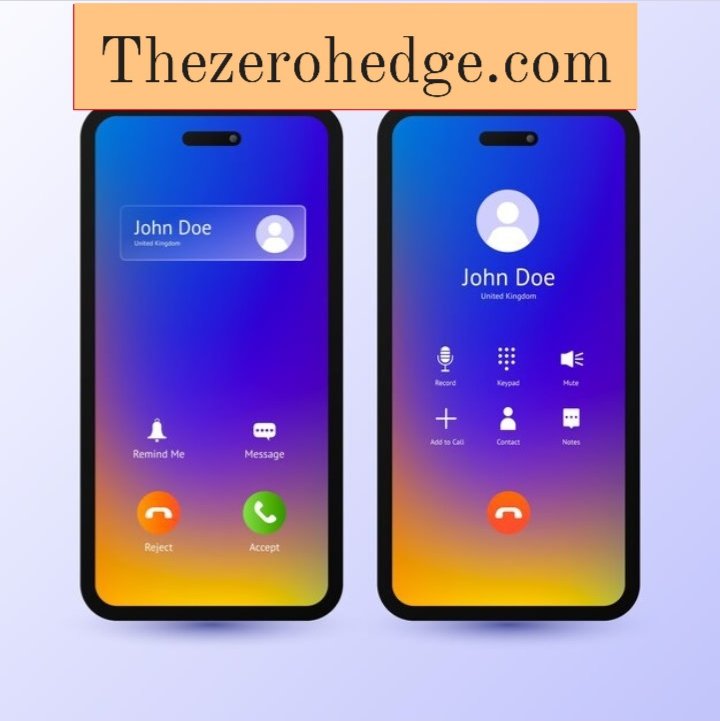
In 2025, the landscape of phone scams and spam calls has continued to evolve, with a rise in fraudulent activities targeting UK residents. Scammers often disguise themselves as legitimate businesses, government agencies, or even well-known companies to gain trust and access personal information. Whether it’s a robocall, a phishing attempt, or a scam trying to lure people into paying for services they don’t need, spam calls are a nuisance that many people face daily.
This article delves into some of the top reported spam phone numbers in the UK in 2025. These numbers have been flagged by various services, including TrueCaller, WhoCalledMe, and other reporting platforms. We’ll examine these numbers, why they’re flagged as spam, and provide practical advice on how to deal with them.
Quick Overview of Top Spam Numbers
Below is a table summarizing the 10 most frequently reported spam phone numbers in the UK for 2025:
| Phone Number | Reported Issue | Frequency of Reports | Source of Reports |
| 3316307343 | Fraud/Scam Call | High | TrueCaller, WhoCalledMe |
| 2033410108 | Robocall/Phishing | Very High | TrueCaller |
| 7537149396 | Scam Call/Impersonation | Moderate | WhoCalledMe, Ofcom |
| 3303413752 | Robocall/Survey Scam | High | TrueCaller, ICO |
| 2038083197 | Debt Collection Scam | High | Ofcom, TPS |
| 1202158180 | Unsolicited Marketing | Very High | WhoCalledMe, Ofcom |
| 1204891727 | Prize/Win Scam | High | TrueCaller, TPS |
| 2034752480 | Robocall/Loan Scam | Very High | WhoCalledMe, ICO |
| 3316306615 | Scam/Phishing | High | TrueCaller |
| 1218231410 | Fraud/Investment Scam | Moderate | Ofcom, WhoCalledMe |
1. 3316307343 – Fraudulent/Scam Calls
The number 3316307343 has been consistently flagged by both TrueCaller and WhoCalledMe as a major fraud number. This number is typically reported in connection with scams where callers impersonate representatives from banks, insurance companies, or other financial institutions. Their main objective is to convince victims to share sensitive personal information, including bank account details or social security numbers.
Many UK residents have reported receiving unsolicited calls from this number, which often claims that there’s an issue with their bank account or that a suspicious transaction has been detected. These scams usually end with the caller asking for verification details or requesting access to the victim’s computer to resolve the “issue.”
What You Can Do:
- Block the number immediately.
- Report the number to your network provider or use apps like TrueCaller or WhoCalledMe.
- Avoid sharing any personal information over the phone, especially unsolicited calls.
2. 2033410108 – Robocall and Phishing Attempt
2033410108 is frequently reported as a robocall number, which often masquerades as legitimate government or telecom services. These calls typically start with a pre-recorded message that asks you to press a number to avoid a fine or penalty, but it ultimately leads to a phishing attempt to steal personal information.
The call may claim that there is an urgent issue with your tax payments, council tax, or even your phone bill. The goal is to create a sense of urgency, tricking victims into providing sensitive details like bank account numbers, passwords, or even credit card information.
What You Can Do:
- Hang up immediately if you receive an automated voice message.
- Never press any buttons or share any personal information over the phone.
- Report the number to regulatory bodies like Ofcom or ICO.
3. 7537149396 – Impersonation Scam
The number 7537149396 is typically reported as a scam call where the caller impersonates a trusted organization or service. It’s common for scammers to pretend they’re from a well-known charity, offering to collect donations, or claiming that you’ve won a prize. Unfortunately, this is just a tactic to gather payment or bank details from the victims.
Reports from WhoCalledMe and Ofcom indicate that the number has been linked to several instances of fraud where the caller convinces people to transfer money or share personal financial details under the guise of charity donations or prize claims.
What You Can Do:
- If you receive such calls, immediately hang up.
- Verify any claims made over the phone by directly contacting the organization.
- Use apps to report the number and protect others from falling victim to similar scams.
4. 3303413752 – Robocall/Survey Scam
3303413752 is flagged by multiple sources as a number used for robocalls that attempt to conduct fake surveys. While these surveys may seem harmless, they’re often designed to gather personal details or direct victims toward additional scams, such as signing up for fake services or agreeing to fraudulent contracts.
Many users have reported that they receive multiple calls from this number, often with different fake surveys promising rewards or discounts. The number of reported scam attempts makes this one of the most frequently reported numbers in the UK.
What You Can Do:
- Block the number if you receive repeated calls.
- Report to the Telephone Preference Service (TPS) to reduce unwanted marketing calls.
- Stay cautious when dealing with unsolicited surveys.
5. 2038083197 – Debt Collection Scam
This number has been associated with fraudulent debt collection activities. The scam works by threatening the victim with legal consequences or debt collection unless they make an immediate payment. Often, the callers use aggressive tactics and attempt to confuse or pressure the person into paying a non-existent debt.
Reports from both Ofcom and TPS indicate that this number is used by scammers who are trying to exploit vulnerable individuals. The scammers may claim that the individual owes money for a loan, tax, or another service and threaten legal action if payment isn’t made.
What You Can Do:
- Never make a payment or share banking details with unsolicited callers.
- Contact the original creditor directly to confirm any claims made.
- Report the number to TPS and the relevant authorities.
6. 1202158180 – Unsolicited Marketing Calls
The number 1202158180 is frequently flagged for unsolicited marketing calls. These calls are typically from companies trying to sell products or services, such as insurance, loans, or home improvement offers. While not always fraudulent, these calls are considered spam and are often made without the consent of the person receiving them.
What makes this number particularly concerning is the volume of unsolicited marketing calls it generates, leading to frustration and annoyance for the recipients. While they’re not always scams, many of these calls can become a nuisance.
What You Can Do:
- Register your number with the Telephone Preference Service (TPS) to reduce marketing calls.
- Use blocking apps to identify and stop marketing calls.
- Report the number to TPS for repeated offenses.
7. 1204891727 – Prize/Win Scam
Reports have linked 1204891727 to prize or win scams. In these cases, the caller informs the recipient that they’ve won a prize or reward, but they must pay a processing fee or provide bank details to claim the prize. This is a common scam tactic to either trick the victim into paying money upfront or steal financial details.
Unfortunately, many victims fall for these scams, believing that the prize is legitimate, only to discover later that it was all a trick.
What You Can Do:
- Never pay fees for prizes or winnings you did not enter for.
- Contact the organization directly if they claim to be affiliated with a prize or contest.
- Report the scam to consumer protection agencies such as the ICO.
8. 2034752480 – Robocall/Loan Scam
The number 2034752480 has been associated with robocalls offering quick loans or credit opportunities. These scams often promise fast and easy loans, but in reality, they are designed to gather personal financial information to either steal from the victim or create fake loans under the victim’s name.
Victims who fall for this scam may end up with a compromised credit history or identity theft.
What You Can Do:
- Avoid taking out loans from unknown callers.
- Report the number to the ICO or use apps like WhoCalledMe to block the number.
- Ensure you only apply for loans through trusted financial institutions.
9. 3316306615 – Scam/Phishing Attempt
3316306615 is another number frequently linked to phishing attempts. These scams are designed to trick individuals into providing personal or financial details through fake calls or emails. The number is associated with scams where the caller poses as a customer service representative from a legitimate company, asking for payment or account verification.
What You Can Do:
- Never share sensitive information over the phone, especially unsolicited calls.
- Use an app to identify and block suspicious numbers.
- Report to authorities like Ofcom or the ICO.
10. 1218231410 – Fraud/Investment Scam
Investment scams often involve callers who promise high returns or opportunities to invest in lucrative ventures. 1218231410 is linked to such fraudulent schemes where the caller persuades victims to invest large sums of money, only for the investment to be a scam.
Many people have fallen prey to these types of scams, often losing substantial amounts of money.
What You Can Do:
- Be skeptical of unsolicited investment offers.
- Verify any investment opportunities through official channels.
- Report the number to Ofcom or WhoCalledMe.
How to Protect Yourself From Spam Calls
1. Block Suspicious Numbers
Use your phone’s built-in blocking features or download apps like TrueCaller, WhoCalledMe, or Hiya to identify and block spam numbers.
2. Report the Number
If you receive a spam call, report it to authorities like Ofcom, the ICO, or the Telephone Preference Service (TPS).
3. Use Call Screening Apps
Many call screening apps can help you automatically filter out unwanted calls, blocking known spam numbers and helping you avoid scams.
4. Don’t Share Personal Information
Never give out your personal information, bank details, or passwords over the phone, especially if the call was unsolicited.
Conclusion
Spam calls continue to be a significant issue in the UK in 2025. Whether it’s a robocall, scam, or fraudulent activity, it’s essential to stay vigilant. By using apps like TrueCaller and WhoCalledMe, reporting spam numbers, and blocking suspicious callers, you can protect yourself from these scams and avoid falling victim to fraud. Stay cautious and always verify any unsolicited communication before providing personal details



